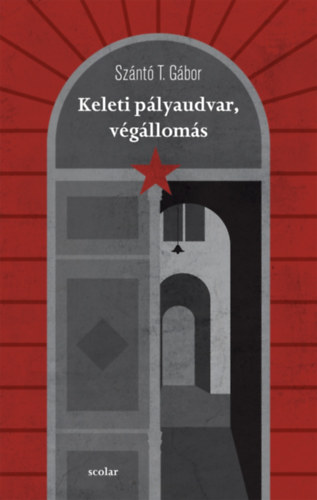
Author: Gábor T. Szántó
Original title: Keleti pályaudvar, végállomás
Title in English: Eastern Station, End of the Line
Publisher: Scolar
Year of publication: 2021
Number of pages: 464
Rights sold: Romania
The several intertwining threads of the novel take place in Budapest in 1949 during the time of the Communist dictatorship. Its protagonists are the survivors of the Second World War and the 1944 persecution of the Jews in Hungary — they have similar memories but have made very different choices. Through them we, the readers, decipher the experiences they lived through, their mental states and their political choices with which they started off their lives after the World War and the Holocaust. Some became part of the Communist regime’s oppressive machinery, while others were its victims.
Benjamin Friedmann, one of the leaders of the religious Zionist movement and a participant in the 1944 Jewish Resistance and rescue mission, is arrested in 1949 in preparation for the show trials bringing down László Rajk, who had been the Minister of the Interior. His case is assigned to major György Benedek, once a left wing Zionist and 1944 resistance fighter who became a member of the Hungarian Communist Party in 1945, then an officer of the State Security Service (ÁVH) who did not reveal his past on his cv. He is a cog in the wheel of the state but is himself frightened and wants to prove himself to his boss, the colonel who had recently returned from his years in Moscow. The struggle between Friedmann and Benedek is the clash between two world views: the Jewish consciousness and a character who expects salvation from Communism, participates in the tyranny and desperately clings to his convictions even when he becomes an accused in the case.
The stories of the two wives are part of this struggle.
The wife of Benedek of the ÁVH, Kata Engel, comes from a well to do, assimilated bourgeois Jewish family but becomes a communist journalist. Kata’s marriage is ideologically sound but otherwise joyless. She is fighting with her parents for self-emancipation, her mother and her art collecting father whose health was ruined when his brother was murdered in 1944 and who has lost his lawyer’s licence under the new regime. Buffeted by her suicidal father, desperate mother and dogmatic husband the pregnant Kata is torn by the conflict. After the arrest of her husband she becomes the lover and agent of the colonel, her husband’s boss.
Friedmann’s wife, Judit, who is left on her own with her two children, is oppressed by the knowledge that her husband’s arrest could have been avoided had she not refused to emigrate. During the time when Friedmann is broken by the threat that his wife will be arrested and his children will be made wards of the state, Judit and the two children, with the help of friends and human traffickers, head for the western border across the Fertő Lake, but she is shot by the border guards. Their daughter is brought back and then disappears into a state run boarding school, but their son Robert manages to get to Israel. According to the “novel within the novel” found in the epilogue it is Robert who searches for his mother and sister in the 80s and 90s and manages to get his father to recount what happened to him, who after having been freed from prison in 1956 comes across his son in Israel. It is also Robert who finds Kata, now pensioned off, who tells him the other part of the story so that Robert Friedmann can finally commit to paper the intertwining memories of the Friedmann, Benedek and Engel families.
Through the lives of the novel’s protagonists we gain insight into the Hungarian bourgeois world, the Jewish petite bourgeoisie and the Communist terror apparatus.
In the literary salon of the Engel family maintained by Klara, who lost her job in radio broadcasting, the artistic elite of the era meet; we get to know the broken down president of the Jewish community, who is forced to accept humiliating compromises to protect his people, and witness the informer turned professor of the rabbinical school who uses alcohol to dull the effects of his conflicts. And we get to know the milieu of the school of a Hassidic rabbi who buries himself in mysticism. They all endure the blows of the Communist dictatorship that slowly suffocates them after having suffered the wounds of the Holocaust.
They have to realize that the Soviet liberation only brought temporary relief, the new tyranny — even if it does not require their physical annihilation — threatens their spiritual existence.
Excerpt in English available
